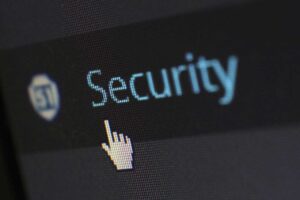6 Tips to Help You Avoid a Cybersecurity Attack
Cybersecurity attacks can be detrimental to your business success and reputation, and no business is immune. In fact, 61% of small and medium businesses have experienced a cyber attack in the past year, according to a study conducted by the Ponemon Institute. Small businesses are especially vulnerable to attacks. According to Cyrus Walker, the Managing Principal at Data Defenders, “The threat environment is active and intense. A cybercriminal has a much greater opportunity for success in attacking a small business because small businesses are very weak in their security countermeasures.”
In order to avoid a data breach and the consequences that come along with it, check out these: 6 Tips to Help You Avoid a Cybersecurity Attack.
1. Secure Your Hardware
In order to fully protect your data from an attack, all of your hardware should be physically protected from loss or theft. Many cyber security techniques focus on protecting the data in your data centers or cloud storage with software and other digital tools. However, it is equally important to ensure that your physical hardware is secure, as data can be easily stolen from individual laptops, desktops and mobile devices. Secure your hardware with the following tips:
- Install an alarm system or security cameras in your office to ward off trespassers.
- Lock down or attach desktop monitors and servers to their desks.
- Protect every device with a complicated and unique password, and only share that password with the employee that uses the device.
Implement “find my device” software for every device that is used by employees to access company data, including personal smartphones.
2. Back Up and Encrypt Your Data
 In the event of an attack, encrypting your data will make it difficult for a hacker to access your sensitive information, while backing up your data will make it so that you can recover what has been lost.
In the event of an attack, encrypting your data will make it difficult for a hacker to access your sensitive information, while backing up your data will make it so that you can recover what has been lost.
According to research published in the International Journal of Advanced Computer Science and Applications, data encryption is the most efficient fix for a data breach. This is because a good encryption will render your data useless to anyone who doesn’t have your software. Because of this, you should encrypt all sensitive data, such as customer and employee information. However, you might want to consider full-disk encryption software, which will encrypt all of the data on a desktop or laptop while it is not in use.
If your data does get stolen, you need a backup strategy to help you retrieve your information and keep your business up and running as normal. Your plan should implement multiple backup methods in order to ensure that none of your data will be lost during a disaster. This means that you should perform daily backups to a portable device or cloud storage service, as well as frequent server backups. You can also practice the 3-2-1 backup method, in which you create three copies of your data, two of which are stored on-site in different mediums and one that is stored off-site. You can even use an online backup provider to monitor and secure your off-site data storage.
3. Educate Your Employees
According to the 2016 Enterprise Phishing Susceptibility and Resiliency Report, 91% of cyber attacks and resulting data breaches began with a spear phishing email that was targeted at an employee. Without proper training and education, employees will not know which emails are safe, and which ones can lead to a disaster.
In order to help employees protect themselves and your company’s data, you should work on creating a security-focused workplace culture. With cyber security at the forefront of their minds, employees will be less susceptible to attacks and more likely to report suspicious behaviour. Improve your security culture by:
- Training employees to recognise phishing red flags such as automated greetings, grammatical errors or demanding calls to action.
- Remind them not to click on links or open attachments from people that they do not know.
- Teach them to avoid unsecure websites when using work devices. You can spot a secure website if it begins with https rather than just http.
- Require employees to change their passwords every few months, and encourage them to make each password complex and different from the previous one
4. Use Anti-Malware and Firewall Software
According to research by Symantec, overall malware variants were up by 88% in 2017, and mobile variants increased by 54%. Malware has quickly become the most prevalent cyber security risk to small businesses today, so it’s essential to have a barrier to protect your information from attackers.
A firewall is a network security system or software that is designed to block your sensitive information from the outside world, preventing unauthorised access to your network and alerting you if an intrusive attempt occurs. Before using a device to access the Internet, ensure that you have a firewall enabled, either from your broadband router or from a third party provider.
Anti-malware, or antivirus, software protects your data by monitoring threats, like a firewall, as well as actually deleting or removing those threats. While a firewall is an important first line of defense, an antivirus software will be necessary to thoroughly scan and remove infections from your files and entire devices. This software can also continuously monitor the “health” of your device, so you can always stay on top of your cyber security.
5. Use Virtualisation
 As more companies go paperless, document storage and entire desktop access is being transferred to a virtual realm. Here are three ways you can use virtualisation to keep your data secure and removed from attackers:
As more companies go paperless, document storage and entire desktop access is being transferred to a virtual realm. Here are three ways you can use virtualisation to keep your data secure and removed from attackers:
A Virtual Data Room (VDR) is another place where you can store sensitive company data, such as financial information, legal documents, tax paperwork and copyrighted works. These virtual rooms act as online databases, making it easy for employees to store and share sensitive information during significant business objectives, such as mergers and transactions.
A Virtual Private Network (VPN) creates a safe and encrypted connection for employees who may be using personal devices or public WiFi. This will keep your company information secure even if your employees are working remotely or travelling for business by providing them with a connection they can trust.
Virtual Desktop Infrastructure (VDI) is technology that hosts an entire desktop operating system on a centralised server that is stored in a data center. This means that an employee’s entire desktop can be made virtual, allowing them to access its information from any device. Your company data will be stored in an off-site data center, so even if a device or server is compromised, your information will stay safe.
6. Install Secure Business WiFi
A secure connection is essential for business security, as attackers can easily hack public or unsecure WiFi networks. When installing a business WiFi network, make sure to choose a solution that meets your security needs.
Your business WiFi solution should take into consideration how many devices are accessing it everyday, as well as what kind of information is being shared during that connection. Here are some tips and tricks to ensure that your WiFi connection is safe and secure:
*Keep your network password protected, and safeguard your password.
*Change the default name and password that is provided with your router to something more complex.
*Create a separate network for customer WiFi with a different password than your main connection.
*Use a WPA 2 (WiFi Protected Access 2), which provides unique encryption for each device that connects to your network.
A new cyber security crime hits the headlines on an almost daily basis: Make sure you’re not involved by taking extra precautions to keep your data safe and secure.
However, you don’t have to tackle your cyber security strategy alone, thanks to Landmark Technologies’ high-quality cyber security services. We can keep your business safe, no matter the size, from both internal and external threats with our layered and customisable approach to cyber security. After an initial audit to determine your individual security needs, we will provide full network coverage, full protection, 24/7 network monitoring and a complete remediation plan.
At Landmark, we’re in the know, why not get in touch with one of our awesome team today, simply visit us at https://landmarktech.wpengine.com/ or join our social community on LinkedIn or Twitter.
Hungry for knowledge, what are you waiting for? Sign up today to get more of our cyber security tips and tricks sent directly to your inbox.
[email-subscribers-form id=”1″]











